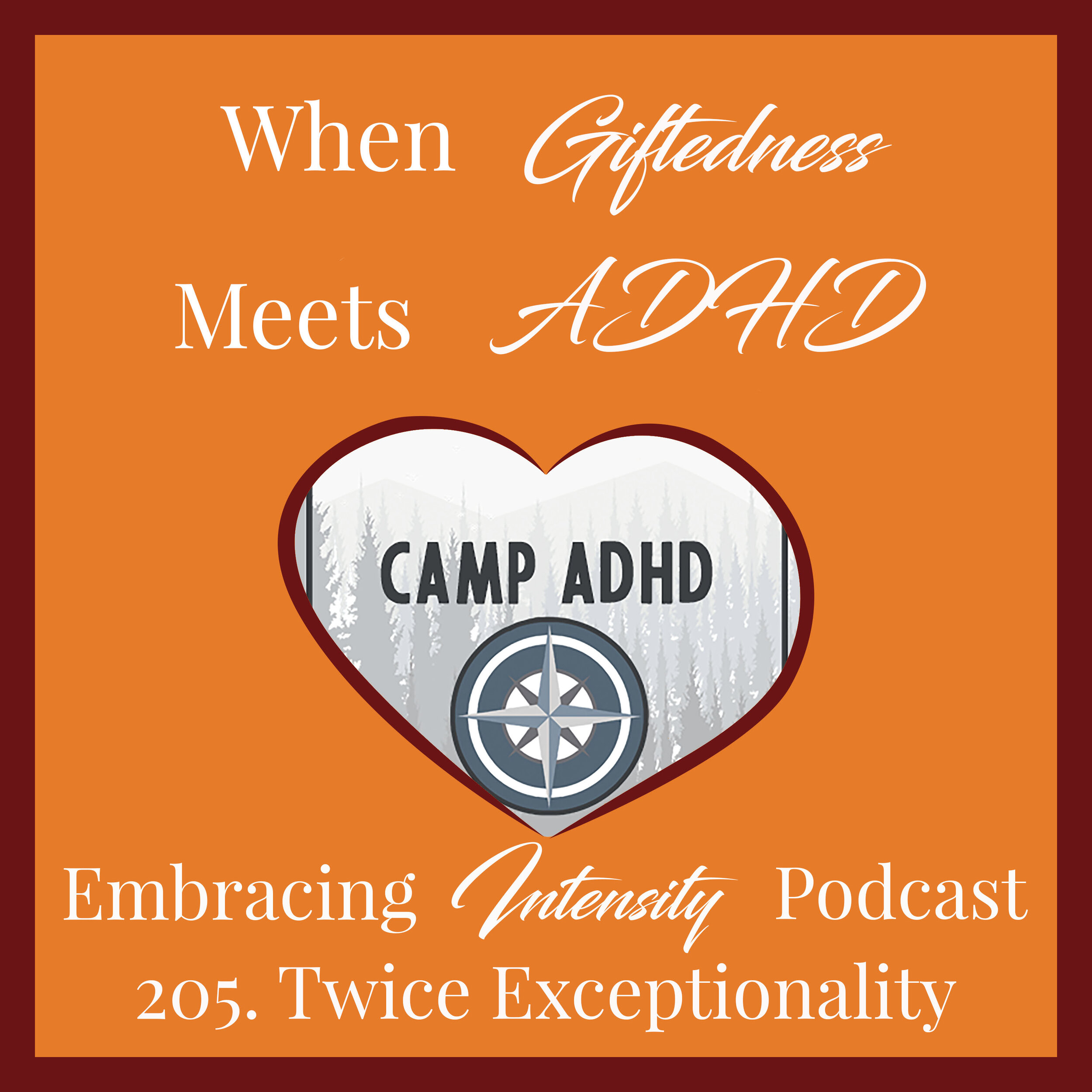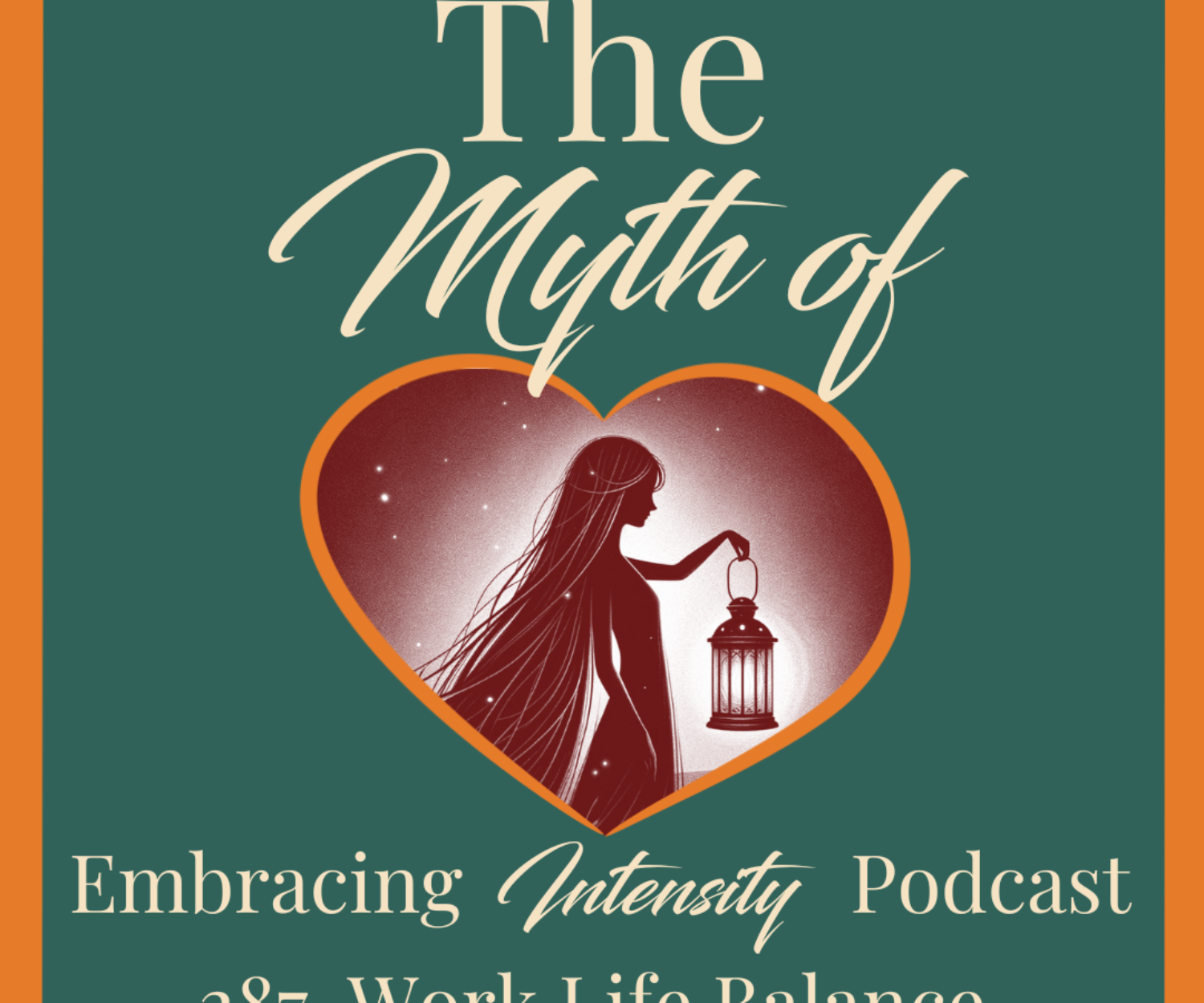A couple of weeks ago I participated in an event called Camp ADHD, where folks around the world shared talks and discussion on topics related to ADHD. I spoke about twice-exceptionality, specifically as it relates to ADHD, and the topic seemed to resonate with a lot of folks, so I decided ot share it on the podcast as well!
Understanding Twice-Exceptionality in Gifted ADHD Adults
For many gifted adults, the combination of high intellectual ability and Attention Deficit Hyperactivity Disorder symptoms creates unique challenges. Twice-exceptional adults (also known as 2 E adults) often struggle with executive functions, time management, and social interactions, despite their exceptional cognitive abilities. Many gifted ADHD adults experience asynchronous development, meaning their intellectual abilities may outpace their emotional regulation or daily executive functioning skills.
This disconnect can lead to social isolation, low self-esteem, and difficulty completing tasks, especially in traditional environments that prioritize good grades over advanced problem-solving skills. Many gifted people with ADHD spend a long time feeling misunderstood or struggling to meet unrealistic expectations placed upon them. The first step in thriving as a gifted ADHD adult is recognizing these challenges and finding strategies to work with your brain, rather than against it.
Explore More!
Giftedness * Identity * Intensity * Neurodivergence * Positive Disintegration * Relationships * Self Care * Self Regulation * Twice Exceptionality
In this episode:
- Why the topic of twice exceptionality is important to me.
- Why it’s important to talk about twice exceptionality.
- Why it often goes overlooked.
- How to recognize when you might be both gifted and ADHD.
- Common themes from assessing 2E ADHD students.
- Strategies that might help if you fit this profile.
Key Takeaways:
- Gifted ADHD adults often struggle with executive functions, meaning they may thrive on intense focus in areas of interest but struggle with routine daily tasks.
- Twice-exceptional individuals can experience both high achievements and underperformance, making it difficult for teachers, parents, or employers to recognize their unique needs.
- Social interactions may feel draining for some gifted ADHDers, as their minds operate at a different pace from the average person. This can lead to social isolation and self-doubt.
- The combination of giftedness and ADHD often results in perfectionism, where gifted ADHD adults struggle to meet their own high expectations while battling ADHD-related executive dysfunction.
- Understanding twice-exceptionality is essential for gifted kids, students, and adults who need the appropriate support to reach their full potential.
Thriving as a Twice-Exceptional Adult
For gifted ADHD adults, understanding how neurodevelopmental conditions like ADHD and giftedness interact is crucial. Recognizing your unique strengths, accepting your learning differences, and developing effective supportsystems can help you harness your exceptional talents without succumbing to gifted kid burnout syndrome. Whether you’re a former gifted kid struggling with ADHD symptoms, an adult ADHD woman navigating career paths, or a parent of a twice-exceptional child, the best way forward is through self-awareness, tailored strategies, and community support.
💡 If this episode resonated with you, join the discussion in the Embracing Intensity Community! Let’s explore how we can support each other on this journey.
Transcript
* Rough Transcript *
Introduction to Aurora
Aurora: Hello, I’m Aurora. I’m a school psychologist and also the host of the Embracing Intensity podcast and community and neurodiverse coach.
Discovering Twice Exceptionality
Aurora: I started to focus on twice exceptionality because of my own personal experiences. and realizing how little information there was out there for 2E adults.
Understanding Twice Exceptionality
Aurora: So, twice exceptionality is being both gifted and disabled.
And so, of course, today, because we’re talking about ADHD, I’ll focus specifically on being gifted and ADHD.
Personal Experiences in Early Education
Aurora: So, I’ll share a little bit about my own personal experience, which started really from when I first started in, in kindergarten, and I was pretty young, and they tried to hold me back because they said I was too immature to go on to the next grade.
Really, I was just kind of all over the place, and I talked a lot, and I asked too many questions.
Challenges in Elementary School
Aurora: But fortunately, my parents really pushed to keep me moving forward, which was a really good thing because I would have been probably extremely bored if they had tried to hold me back my entire elementary school.
I really felt like. I know teachers like me. I was in a very authoritarian type school setting. And so, I actually remember distinctly the very first teacher that I thought actually liked me. And that was in fourth grade. And I also remember, I’m pretty sure that was the same year, that it was the one year that I actually got Citizen of the Month.
And all my other friends got it pretty much every year. And so until 5th grade, I was unidentified for either giftedness or ADHD because I was in a Spanish immersion program and the test was in English.
Middle School and High School Struggles
Aurora: So it wasn’t until 5th grade that I was able to move forward. And in 5th grade, I tested so high that the A psychologist or counselor said that I needed to get out of that school and into a full time gifted program.
So at that point, they had had me in a second grade reading book, because I wouldn’t do the busy work in English. And when they tested me at the new school, I was reading at a 6th or 7th grade level. So I was actually reading higher than my grade level, but they had me three or four books. behind because I wouldn’t do the busy work.
And that would be sort of the emblem of how my education would go over the years, is that I could do the advanced stuff, but the basic busy work stuff was the hardest. And I think that’s something to be really aware of. That’s a common theme that I find with twice exceptionality in general, is that oftentimes it’s the more The more complicated things that come easier for us and the more difficult things for us are actually the things that others find easy, which makes it very confusing because they’ll look at you and say, well, you can do this thing that’s so complicated, but you can’t do this basic thing.
And they think that it’s a, it’s a contradiction, but it really isn’t because they’re two different parts of the brain. So by the time I got into high school, I had a really great middle school experience, but then I was in a high school full of really high achievers, and I became very resentful and angry, and I had no idea why it was that I was an underachiever.
I just knew that I didn’t fit inside that school box.
College and Health Issues
Aurora: And when I went on to college, I actually Ended up dropping out my first, my sophomore year. I had a major physical breakdown. I couldn’t, I had all sorts of health issues that led to things like fibromyalgia and chronic fatigue and it was the stress really of everything that was going on caused a lot of physical problems.
First Encounter with ADHD
Aurora: So when I dropped out of college the first time my dad gave me a book on ADHD, and it was the first time I’d even heard of ADHD, and I didn’t know at that point there wasn’t a lot of information about it, and there was definitely not a lot of information for girls, and so when I read that information, it really resonated, and I was pretty sure that it was me, but by that point, I had actually started to kind of figure out what was working for me, and in grad school, I actually found some new strategies, and so I was able to work within the system and move on to become a school psychologist, which has a very structured and it’s very based on deadline and urgency.
And so I was able to go through many years as a professional in that way.
Professional Life and Diagnosis
Aurora: However, The stress of it would leave me so that every summer I needed that three months to recover because I was so exhausted and I didn’t really make the connection that it was my, the, the challenge and taxing on my executive functioning to, to keep going in that urgency driven environment was really contributing to my chronic pain.
And so that is why I finally got diagnosed at 45 while almost 45. I’m 45 now. And so this, just this past year, I finally got actually diagnosed.
Importance of Recognizing Twice Exceptionality
Aurora: So, why is it important that we understand what twice exceptionality is, and how to recognize it, and what to do about it in ourselves? Well, there’s a couple of re a couple of possible outcomes that might come if twice exceptionality isn’t recognized.
Giftedness Masking ADHD
Aurora: One of those things is that, for some kids, their giftedness can mask their ADHD, and because of that, they get through and people will, will dismiss their issues, and like me, they may end up having some chronic pain and fatigue. And as Renee Brooks of Black Girl Lost Keys says, oftentimes people confuse intelligence with executive functioning.
And they think that they’re the same thing, but they’re not. And that’s something that’s really a challenge when, especially as when we get older, and we don’t have those structures of school to keep us in line, we have to rely on urgency and external deadlines and things that are really taxing on our system.
That’scan cause a lot of stress and other health issues, and eventually we may not be able to keep up.
ADHD Masking Giftedness
Aurora: Another possibility is that our ADHD might mask The actual giftedness and this is something I’ve seen both with group testing that’s given for kids for giftedness because a lot of a lot of the kids who are highly distractible don’t do well on those group tests and so they’re not necessarily representative of their true True potential.
But even one on one testing, even when we give a kid a test in a one on one setting, it still might not reflect their ability. If they’re easily distractible, easily bored, unmotivated.
Behavioral Challenges and Misdiagnosis
Aurora: I had this one kid that I tested a while back in eighth grade and his math teacher recognized the characteristics of giftedness in him.
But he had tested in the solid average range with no major spread in his previous testing. So we didn’t, weren’t even planning on, on testing him at that point, but we did. And I really hyped it up and made sure that he was viewing it like a fun challenge. And I could really see this kid had some major, major gifts and he had this drive for.
figuring out puzzles and challenges and all of this stuff that he was super excited about. And when he was excited about it, he scored in the superior range. But when it was a task that he felt was kind of boring, meh, then he scored in the average range. And so it was so clear that his attitude contributed to how he performed on the test.
And so when I talked to him about that after the test, his science teacher said he was like a different kid, because suddenly In the science class, he was actually approaching it like a challenge and doing really well, where before he saw it as a boring task and he wasn’t doing well at all. And so just that one tweak was able, allowed him to really meet his potential in that class.
And It’s so important that we recognize that because this is a kid who was having so many behavior problems in the classroom because he just was so hyperactive and he would just do these impulsive things that were just way out, you know, and disruptive and so they put him in a more restrictive English class and that’s probably about the worst thing you could do because he Actually would be even more bored in that setting because what he needed really wasn’t less challenge It was actually more challenge.
Recognizing Twice Exceptionality in Students
Aurora: And then another possibility is that our giftedness actually watch appear on the surface to wash each other out, so you don’t actually see either of them or recognize either of them. Or on the other hand, as, uh, Tom Nardone of the Tom Nardone Show interviewed me once on another podcast, and he mentioned that when his mom had him tested for the gifted program, he deliberately bombed the test.
So he cheated his way out of the gifted program because he didn’t want And so that’s another possibility is that kids are not really, they’re unmotivated so that they actually purposefully do poorly so that their expectations stay low. And I think sometimes we do that as adults too, where we don’t want to raise the bar so high because we were afraid not to, to reach it.
So we might actually deliberately do things. not up to our ability because we don’t want to set an expectation of a certain level.
Key Traits of ADHD and Giftedness
Aurora: So, how do you recognize when you might be both gifted and ADHD? There are some key themes that I’ve seen over the years when there’s both ADHD and giftedness at play. So some general ADHD traits that might differentiate from giftedness or just being bored from giftedness include things like general disorganization, feeling very chaotic, time blindness, needing a sense of urgency in order to get anything done, which can be exhausting, and Uh, the tendency for things to be out of sight, out of mind.
Oftentimes, our big picture thinking is stronger than the details. However, when we get really, really into something, then we might really narrow focus on those details, that hyper focus piece. And where that also comes into play is that more complicated Big picture concepts may come really easily, but we may miss details like conventions and our spelling and that sort of thing, so that’s another place it might come into play.
Oftentimes we’re told we’re not living up to your potential, having trouble visualizing what done looks like. And some additional things that were shared by Brendan Mann of ADHD Essentials, who is speaking on the Wall of Awful to my community soon. He talks about having trouble really executing on our big ideas.
So we may have these big, wonderful, amazing ideas and creativity, but we have a hard time executing them. Seeming less responsible or mature than our peers. And, um, There’s a few traits that I generally associate with giftedness that may be increased when you add ADHD into the mix.
Challenges with Busy Work
Aurora: So some of those things include things like finding busy work really painful.
That’s an issue that I had as a kid. It’s hard, you know, for my son to write out the math problems because he does it all in his head. Those things can be excruciating. to do things that feel like busy work, and then things that other people find very basic can be more difficult for us, but then we can do these complicated things that confuse people.
And I think one of the biggest things that I’ve seen when I’ve observed students that are like this is that they love a challenge. But they hate work. And sometimes where that comes to play is how, you know, it depends on how they’re viewing a certain task. So, for example, while a lot of People with ADHD have struggles with working memory and processing speed.
Sometimes you get these kids who actually do better on the work, on the most complicated working memory tasks, like when you’re saying numbers and having to manipulate them, they actually say more numbers backwards than forwards because it’s more of a challenge. When they’re forwards, there’s no challenge in that, so they’re not paying as much attention.
We can also be prone to all or nothing thinking, and when I’ve given assessments on students like this, IQ or Achievement Assessments.
Patterns in Testing and Performance
Aurora: Some of the patterns that I’ve observed in their testing include things like, like I said, often times working memory and processing speed tend to be lower, but every now and then you find that one that’s just like really driven by that challenge and they actually score really, really well.
So, scoring well on those does not rule out ADHD. And academically, they often score lower on the more basic tasks. So like, when you look at reading, they’ll score lower on the basic reading, but actually higher on the comprehension. And in math, they’ll score lower on the computation part, but then they actually score higher on the math reasoning.
And so that’s a common pattern that I see. And they also tend to miss details in spelling, conventions, and that sort of thing. But they get the big picture context.
Strategies for Twice Exceptional Individuals
Aurora: So if you’re twice exceptional, or you think you might be twice exceptional, or you have a family member that is twice exceptional, what are some things that can help?
Well, first of all, you need to forget the conventional wisdom of what you think you should be doing. And, or what you’re supposed to be doing. And understand that It’s not a contradiction to be able to do more challenging things, but yet find the basic things difficult. Those are two different parts of the brain.
And so, understanding that and explaining that and, and forgiving yourself for those things that seem so basic that are so much harder for you to do is really important.
Reframing Challenges as Fun Tasks
Aurora: Another thing that I found really helpful is Trying to reframe things that feel like work into a challenge. So if there’s some way, and this is something, this is true of ADHD in general, right?
If we make it more of a fun task, then we can do it more easily. But taking it as a challenge is something that can help us reframe what it is that we’re doing in a way that might be more motivating.
Embracing Individual Strengths
Aurora: And then it’s really important to find and recognize your strengths and so understand what it is that you do well and really try to find ways to use that more in your life and realizing that we often undervalue what it is that we are good at and we have to offer and appreciate it.
overvalue what other people are good at and what other people have to offer. And so when we understand that, then we can realize that there are other people out there who are overvaluing what we have to offer and find it way more valuable than what they have to offer. And so if we can find other people who have strengths that are Complimentary to our own strengths, but different then we can find ways to get things done that are more intuitive, more productive, and not, not keep pushing ourselves against a wall of what we think we should be doing.
So in the end, basically the biggest thing that we need to do is to let go of what it is that we think we should be doing and how we should be doing it. And stop butting our heads against the wall when we’re, when we’re pushing ourselves to do something that doesn’t come naturally and to really explore what it is that our strengths and to, to flow with those in a way that works for us.
And there’s, everybody’s different. What works for everybody is going to be different. Each person is individual and so we have to look at them individually. So I’d love to see in the comments what has helped you to help yourself go with the flow of your strengths instead of pushing against your weaknesses.





